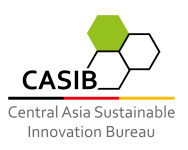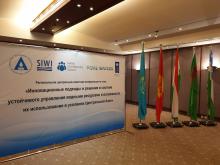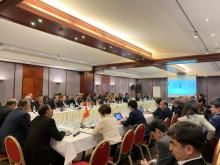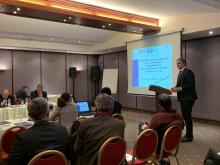On December 18-19, 2019, a conference on Innovative approaches and solutions in the system of sustainable water resources management and opportunities for their use in Central Asia was held in Almaty, Kazakhstan.
The event was hosted by The Executive Board of the International Fund for Saving the Aral Sea in the Republic of Kazakhstan – a fund dedicated to protect what remains of the Aral Sea on Kazakh national territory that emerged in 1993 out of an agreement all Central Asian heads of state committed to in order to jointly overcome the Aral Sea disaster – together with the United Nations Development Programme (UNDP) in Kazakhstan.
Besides representatives of UNDP, GIZ, and German enterprises in the renewable energy sector, participants included:
- Kenzhekhan Abuov – Asian Development Bank, Central and West Asia Department
- Kaini Stamkulova – International Fund for Saving the Aral Sea, Executive Board in Kazakhstan
- Dr. Mirobit Mirdadayev – Kazakh Scientific Research Institute of Water Economy
- Dinara Ziganshina, PhD – Scientific Information Center of Interstate Commission for Water Coordination in Central Asia
- Dr. Sagit Ibatullin – International Teaching Center for Dam Safety
- Arystanbaev Yakhya – Satpaev University & TOO "Institute for Hydrogeology und Geoecology Akhmedsafina"
In light of the Aral Sea catastrophe, water management experts – for instance government consultants – of all Central Asian countries came together to exchange views on sustainable utilisation of Central Asia's water resources. Among the consequences of the agricultural practice in the lake's catchment area and its man-made desiccation that both the local population and wildlife are suffering from to this very day are the collapse of the fishing industry as an important source of food and income, the migration of qualified workers, high poverty, malnutrition, a wide spectrum of severe diseases, high child mortality, reduced life expectancy, and also an enormous loss of species and individuals. Due to the lake's unfavourable location in a wind corridor from West to South, the grave ecological impacts are also being perceived globally. At the same time, water is a resource that has always been scarce and fought over in Central Asia's landscape of irrigated agriculture – and its availability is only going to decrease in the course of climate change, calling for careful transnational management. The event, thereby, matched the CLIENT II focal points water management and in a wider sense also land management.
The discussion started out in the form of presentations, grouped by topic into the following sections:
- Redistribution of the water flow between basins as one of several methods to increase the amount of available water resources
- Low-pressure small hydropower stations as a guarantee for adequate consideration towards riparian/river ecosystems
- Restoration of river valleys – a method to increase the rivers' water volume as well as enhance the water quality
- Modern methods of water protection and balancing
- Methods and perspectives for the utilisation of geothermal and industrial groundwater
- New methods for local drainage systems in small towns and rural communities
In this context, head of bureau Dr. Peter Liebelt presented WUEMoCA, a scientific web-mapping tool for regional monitoring of both water and land use efficiency in the Aral Sea basin that was recently developed by scientists from the universities Würzburg and Halle-Wittenberg as well as Greenspin GmbH Würzburg and the IC ICWC Tashkent (Scientific Information Centre of the Interstate Coordination Water Commission). WUEMoCA stands for "Water Use Efficiency Monitor in Central Asia" and is an important result of the joint research project "CAWa – Research Network Water in Central Asia", that was funded by the German Federal Foreign Office for several years and terminated in the end of 2019.
Following this, the participants worked out project ideas for UNDP in small working groups; unfortunately, no government representatives attended.
For CASIB, the event was highly interesting for several reasons:
- it provided an overview of currently relevant issues in the (CLIENT II) fields of water and land management
- it showed potential points of intersection with currently running or planned activities/developments with CLIENT II projects
- it allowed for active participation in the development of project proposals for UNDP in working groups
- it served the identification of future research needs in Central Asia, which can be the basis for new ideas regarding further funding measures by the German Federal Ministry for Eduaction and Researc
- it created a platform for dialogue with potential partners and supporters of CLIENT II projects – sie schuf eine Plattform für Gespräche mit potenziellen Partnern und Unterstützern der CLIENT II Projekte – e. g. the Central Asian Development Bank, a strategically interesting player for the goal of commercialising current and future pojects in the long run
- Log in to post comments



